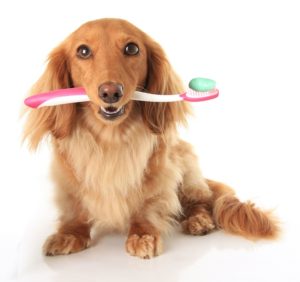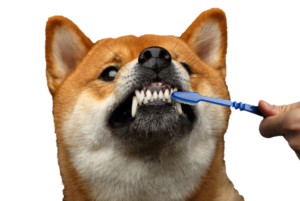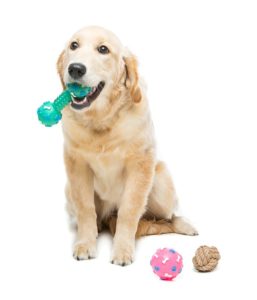
Why Pets Need Dental Care
 Even the most caring pet owner can overlook dental care for their pets, and some don’t realize that good dental habits apply to cats as well as dogs.
Even the most caring pet owner can overlook dental care for their pets, and some don’t realize that good dental habits apply to cats as well as dogs.
Good dental health not only gets to the root of oral health but also supports overall pet wellness,
because oral care is about more than teeth. Bacteria can enter the bloodstream and travel to lungs, heart, kidneys and liver, causing serious illness.
Symptoms of dental problems can be easy to miss, and often aren’t evident until an issue has reached advanced stage.
Dental and Periodontal Disease are among the most common diseases among cats and dogs.
And among the most preventable.
There are 3 Stages of Dental Disease
Plaque builds on teeth that are not regularly brushed.
Gingivitis allows for tartar to grow and calculus to form, spreading to underlying gums to create pockets that harbor bacteria.
Periodontal Disease results with the breakdown of tissue supporting teeth and bone, resulting in gums and bones that support teeth becoming compromised.

As bone dissolves, pets experience advancing discomfort and pain.
Telltale signs of oral distress are abnormal or difficulty chewing, and even failure to eat, pawing at the mouth or rubbing face on the ground. Bad breath can also be a symptom.
Deteriorating dental conditions can be prevented by proper management with regular dental exams and routine cleanings that include…
- Gum Probing
- Dental X-Rays
- Scaling and Polishing
- Periodontal Treatments, When Required
- Thorough Oral Exam, including examination of lymph nodes, tonsils and tongue
Along with regularly scheduled dental exams and cleanings, prevention of plaque buildup can be helped by daily brushing, providing dental chew toys that are durable, but not so strong as to fracture teeth, and feeding hard kibble vs. soft food.
 As always, a vigilant owner is a pet’s best friend, so check regularly for…
As always, a vigilant owner is a pet’s best friend, so check regularly for…
- Red Inflamed or Bleeding Gums
- Loose Teeth
- Bad Breath
- Difficulty Chewing
- Pawing or Sensitivity at the Mouth
- Discolored Teeth
- Change in Eating Habits
Bear in mind that toy breeds tend to have more frequent dental issues, given the cramped spacing of their teeth.
Good pet oral health produces a lifetime of results – Now that’s saying a mouthful!





